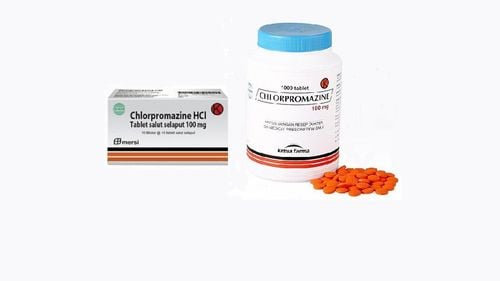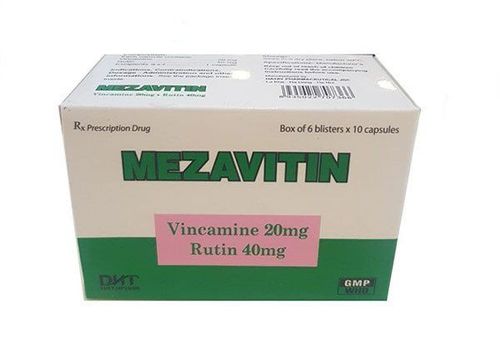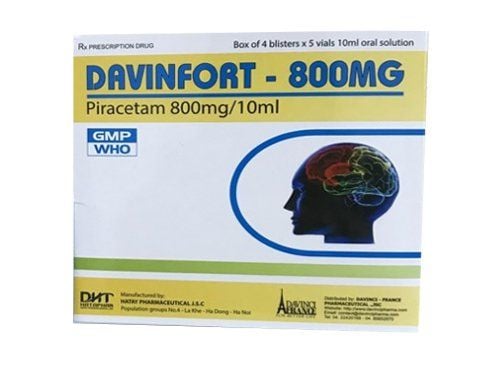This is an automatically translated article.
Alzepil 5mg is mainly used to treat symptoms of mild to moderate memory impairment in patients with Alzheimer's disease. In order to ensure the safety and effectiveness of treatment with Alzepil, patients should carefully consult their doctor about the use and dosage of the drug.1. What is Alzepil 5mg?
Alzepil 5mg is a product of Egis Pharmaceuticals Private Limited Company, is prepared in the form of round, white, film-coated tablets with 2 convex sides, in which one side is engraved with code 381 and the other side is engraved with the letter E Alzepil has the main ingredient donepezil hydrochloride 5mg, which is used to treat symptoms of mild or moderate memory impairment in Alzheimer's disease.
2. Indications and uses of Alzepil 5 mg
2.1 Indications to use Alzepil 5 mg Alzepil is mainly indicated for Alzheimer's patients with symptoms of mild to moderate memory impairment. However, this drug should be avoided in subjects who are sensitive to piperidin derivatives, the active ingredient donepezil or any of the excipients contained in Alzepil.
2.2 Uses of the drug Alzepil 5 mg *Pharmacodynamics
The active ingredient donepezil is a predominant cholinesterase in the brain, and a specific - reversible inhibitor of acetylcholinesterase. In a clinical trial involving Alzheimer's patients with dementia, a single dose of 5 mg or 10 mg of Alzepil resulted in comparable steady-state acetylcholinesterase inhibition. with 63.6% and after the next dose is 77.3%.
*Pharmacokinetics
Absorption: After taking Alzepil for 3-4 hours, the active ingredient donepezil will reach peak plasma concentrations. The area under the curve and plasma concentrations tend to increase proportionally with the dose used. The estimated half-life of Alzepil is approximately 70 hours. Patients can repeat single daily doses to gradually reach stable concentrations. Food does not adversely affect the absorption of the active ingredient donepezil hydrochloride. Distribution: The active ingredient donepezil hydrochloride has a plasma protein binding rate of up to 95% and can be distributed in various tissues of the body. After taking a single dose of 5mg Alzepil after about 240 hours, the active ingredient in the drug will bind to radioactive carbon (14C), of which about 28% of the drug is not eliminated from the body. This indicates that the active ingredient donepezil and its metabolites can stay in the body for more than 10 days. Metabolism and Elimination: The drug is eliminated mainly in the urine and is metabolized to various substances via cytochrome P450. Approximately 14.5% of the dose of Alzepil is excreted in the feces, of which up to 57% of the dose is excreted in the urine. The test showed that the plasma concentration of donepezil gradually decreased with a half-life of nearly 70 hours.
3. Dosage and how to use Alzepil 5mg
3.1 Dosage of Alzepil 5 mg Usual dose of Alzepil for adults:
Patients can start Alzepil treatment with a dose of 5mg, the frequency of 1 time / day and maintain at least one month for evaluation. clinical response to treatment, and steady state concentrations of donepezil. After about 1 month of using Alzepil, the physician may base on clinical judgment and make a decision to increase the dose up to 10mg/time/day, the maximum dose should not exceed 10mg.
Alzepil dosage for patients with liver / kidney failure:
Alzepil treatment regimen for patients with renal failure can be applied similar to the usual dose for adults because this condition does not affect the clearance of the active substance donepezil. For patients with mild-moderate hepatic impairment, exposure may be increased, therefore, the physician may recommend an adjustment of the dose of Alzepil based on the individual tolerability of the drug.
Dosage of Alzepil for children:
There is no safety information about the use of Alzepil in children, so doctors do not recommend this medicine for this audience.
3.2 How to use Alzepil 5mg drug Alzepil 5mg drug can be taken in the evening (the time right before going to bed). Discontinuation of treatment with Alzepil will lead to a gradual decrease in the beneficial effects of the drug. Although there is no evidence of adverse effects after patients abruptly stop taking Alzepil, patients should strictly follow the dosing instructions recommended by their physician.
3.3 How to manage an overdose of Alzepil 5mg Overdose of Alzepil can lead to cholinergic stimulation with symptoms such as:
Watery eyes. Reduced spontaneous movement. Walk wobbly. Respiration is inhibited. Mydriasis, salivation, bradycardia, or tremors. Localized muscle spasticity, decreased respiration and body temperature. In addition, taking an overdose of Alzepil can also cause acetylcholine secretion, characterized by symptoms such as: salivation, nausea, vomiting, bradycardia, sweating, respiratory depression, hypotension. blood pressure, seizures and strokes. If the respiratory muscles are affected, it can damage the muscles and lead to death.
Even in any case of Alzepil overdose, the patient should also apply systemic supportive measures. In case of overdose of the active ingredient donepezil hydrochloride, the patient can be treated with a third-line anticholinergic agent (eg, atropin) for detoxification. Alternatively, the physician may also give the patient an intravenous dose of atropine sulphate 1 to 2 mg (initiation) and adjust the dose thereafter based on clinical response.
4. Some side effects of Alzepil 5mg
During treatment with Alzepil 5mg, patients may experience the following side effects:
Very common side effects: Nausea, diarrhea, insomnia, muscle cramps and fatigue. Common side effects: Anorexia, common cold, agitation, hallucinations, fainting, dizziness, gastrointestinal disturbances, vomiting, itching, rash, urinary incontinence, fatigue and headache. Uncommon side effects: Convulsions, bradycardia, peptic ulcer, gastrointestinal bleeding or slight increase in serum creatine kinase levels. Rare side effects: Presence of extrapyramidal manifestations, atrioventricular block, sinoatrial block or impaired liver function (hepatitis). Very rare side effects: Neuroleptic malignant syndrome. When any of the side effects mentioned above appear, the patient should promptly notify the doctor or go to the nearest hospital for treatment.
5. Some things to be careful about when treating with Alzepil 5mg
5.1 Things to note before using Alzepil 5mg Here are some important notes that any patient should know before deciding to treat with Alzepil 5mg:
Active ingredient donepezil hydrochloride has succinylcholine-type muscle relaxants during anaesthesia, so patients should tell their doctor if they are taking Alzepil prior to surgery. The effectiveness of Alzepil in patients with Alzheimer's disease with severe memory impairment or age-related cognitive decline has not been specifically evaluated. Alzepil may have a neurotropic effect on the sympathomimetic effects of the heart rate, eg bradycardia. This effect of the drug can seriously affect patients with sinoatrial, atrioventricular block or sinus syndrome. Some patients even fainted or had convulsions after taking Alzepil. People with a history of peptic ulcers or who are taking NSAIDs should use caution when treated with Alzepil. Because the drug has choline-like effects, patients with a history of obstructive pulmonary disease or asthma should use Alzepil with caution. Avoid concomitant use of Alzepil with other cholinergic agonists, antagonists or acetylcholinesterase inhibitors. 5.2 Interactions with Alzepil 5mg According to research, the active ingredient donepezil or any of its metabolites is not capable of inhibiting the metabolism of drugs such as warfarin, theophylline, digoxin or cimetidine. However, patients should avoid concomitant use of Alzepil 5 mg with inhibitors of CYP3A4 and 2D6 such as ketoconazole and quinidine, because these substances may inhibit the metabolism of the active substance donepezil in the body. According to research, when taken with Alzepil, ketoconazole can increase the concentration of the active ingredient donepezil by about 30%.
In addition, enzyme inducers such as carbamazepine, phenytoin, rifampicin and alcohol may decrease the concentration of Alzepil when used in combination. Besides, the active ingredient donepezil also has a significant effect on the effects of anticholinergics, and interferes with drugs such as neuromuscular blocking agents, beta blockers, succinylcholine, cholinergic agonists,...
Alzepil 5mg is mainly used to treat the symptoms of mild to moderate memory impairment in patients with Alzheimer's disease. To ensure the effectiveness of treatment and avoid unwanted side effects, patients need to strictly follow the instructions of the doctor, professional pharmacist.
Follow Vinmec International General Hospital website to get more health, nutrition and beauty information to protect the health of yourself and your loved ones in your family.
Please dial HOTLINE for more information or register for an appointment HERE. Download MyVinmec app to make appointments faster and to manage your bookings easily.













